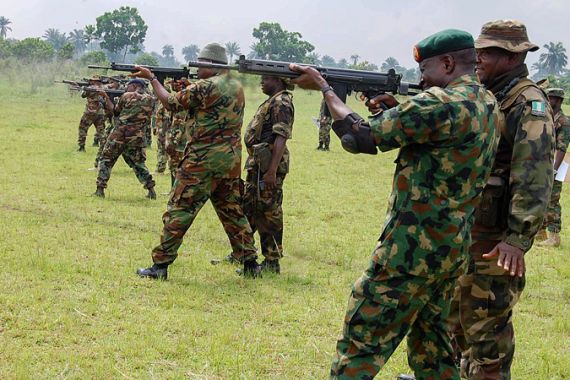Nigerian forces ‘shell fighter camps’
At least 21 people killed in Borno state as army launches offensive against Boko Haram strongholds in the northeast.

A security official in northeast Nigeria says soldiers have shelled suspected camps of armed groups in the region, killing at least 21 people.
The official said on Friday that the fighting happened on Thursday in the Sambisa Forest Reserve, just south of Maiduguri, the capital of Borno state.
The official said that soldiers would remain in the area to secure it.
The official also said that Nigeria’s government shut off mobile phone service to parts of northeast Nigeria as soldiers moved in to enforce an emergency declaration by President Goodluck Jonathan over three states there.
Phone service was restored on Friday, but the official said the phones likely would be shut off again.
Earlier, Nigerian forces began deploying fighter jets and helicopter gunships to target Boko Haram strongholds, security sources told Reuters news agency.
The military said that it was ready to launch air strikes against the Boko Haram as several thousand troops moved to the remote northeast region to retake territory seized by the group.
A force of “several thousand” soldiers along with fighter jets and helicopter gunships were deployed for the offensives in Borno, Yobe and Adamawa state, Brigadier-General Chris Olukolade, a defence spokesman, said.
Curfew imposed
Telephone connections to Borno and Yobe remained completely cut on Thursday, and a 12-hour overnight curfew was imposed in Adamawa, following the other two states which are already under curfew.
In some parts of Maiduguri, and in Yola, the capital of Adamawa state, traffic returned to roads and shops re-opened on Friday, as most military operations took place in remote rural areas. Roads out of the city to such areas were sealed off by soldiers.
The operation comes after President Goodluck Jonathan imposed a state of emergency in all three areas as he admitted that Boko Haram had “taken over” territory in the northeast and declared war against the government.
|
The increased military presence follows a surge in violence against government and Christian targets in the northeast by Boko Haram, a group fighting against Western education that wants to impose Islamic law in areas controlled by them.
The offensive has been cautiously welcomed by some in Nigeria, but the army’s reputation for excessive force is causing concern around the world.
Rights groups said they feared for the safety of civilians from combatants on both sides, but Jonathan’s move enjoys widespread public support after more than three years of trying to contain the insurgency without notable success.
The US expressed fears over a worsening “cycle of violence” on Wednesday, and warned that any “heavy-handed” tactics or disregard for human rights during the emergency operations could damage bilateral relations.
On Friday, US Secretary of State John Kerry issued a strongly worded statement saying: “We are […] deeply concerned by credible allegations that Nigerian security forces are committing gross human rights violations, which, in turn, only escalate the violence and fuel extremism”.
The US “condemns Boko Haram’s campaign of terror in the strongest terms”, Kerry said, but urged Nigeria’s armed forces to show restraint and discipline.
Rights groups have documented cases of abuses by Nigerian forces, including summary executions and random shootings.
“If the military continues its practice of targeting civilians, there is a risk of massive abuses during this offensive,” Eric Guttschuss, from Human Rights Watch, said.
